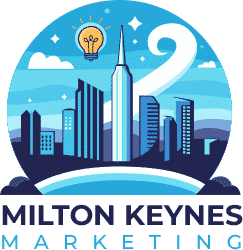Technical Marketing Agency Milton Keynes | SEO & PPC
Technical marketing agency Milton Keynes — engineering SEO, data-driven PPC and conversion-focused web design to boost qualified leads and sales.
Technical Marketing Agency Milton Keynes
We are the technical marketing agency Milton Keynes businesses rely on for measurable growth. Whether you run a local shop, e‑commerce store or B2B service, our technical-first approach combines engineering-grade SEO, data-driven PPC and conversion-centred web design to turn visibility into commercial results. Arrange a free consultation to discover exactly how we increase qualified leads and sales — Call +44 7484 866107 or email **@*******************ng.uk.
Why choose a technical marketing agency in Milton Keynes?
- Engineering and measurement sit alongside creativity — we fix root causes, not just symptoms.
- Local market knowledge: campaigns tuned to Milton Keynes search patterns, commuter routes and catchment areas.
- Senior consultants with hands-on experience in site architecture, schema, speed and analytics.
- Commercial mindset: every tactic is tied to revenue metrics and conversion goals so activity drives outcomes.
If you want focused, measurable growth for your Milton Keynes business, arrange a free consultation — Call +44 7484 866107 or email **@*******************ng.uk.
Our services — practical, technical and results-focused
We group services around performance drivers so you get a joined-up strategy and predictable outcomes. Below are the core capabilities that power faster, safer organic growth and more efficient paid acquisition.
Technical SEO (core)
- Site architecture audits and crawlability fixes
- Structured data / schema implementation
- Page speed optimisation for desktop and mobile
- Canonicalisation and indexation strategy
- Log file analysis and crawl budget recommendations
Why it matters: technical issues stop even the best content from ranking. We make your site searchable, fast and accessible for users and bots — reducing wasted crawl, improving indexation and enabling rich results.
Local SEO for Milton Keynes businesses
- Google Business Profile optimisation and management
- Local citations and NAP consistency across directories
- Location pages optimised for nearby towns and suburbs
- Localised content and review acquisition strategy
Why it matters: local search drives footfall and high‑intent enquiries in Milton Keynes. Proper local SEO converts searches into customers by matching searcher intent with precise local signals.
On-page SEO & content engineering
- Keyword mapping aligned to commercial intent
- Content structure audits and topical clustering
- Meta titles, descriptions and semantic HTML improvements
- Optimisation for featured snippets and other rich results
Why it matters: excellent copy needs technical scaffolding to surface in search. We align page structure and content to buyer intent to capture high‑value queries.
PPC management with technical rigour
- Google Ads account builds and restructuring
- Conversion tracking using server-side and client-side methods
- Smart bidding informed by first‑party data
- Landing page testing and funnel optimisation
Why it matters: paid search must be measurable and scalable. We reduce waste, improve ROAS and integrate PPC with organic insights to optimise total acquisition cost.
Conversion-focused website design & development
- Speed-first front-end and back-end builds
- Accessibility and WCAG compliance checks
- Design for micro-conversions and clear user journeys
- A/B testing and iterative optimisation
Why it matters: a technically sound site improves user experience and conversion rates. We deliver fast, responsive sites built to convert visitors into leads and sales.
Content marketing with technical distribution
- Content plans tied to search opportunity maps
- Technical content formats: FAQs, structured how‑tos, use‑case pages
- Syndication and structured distribution for rich result eligibility
- Performance measurement and refresh schedules
Why it matters: content must be discoverable and convertible. Our content engineering ensures it ranks, appears in rich features and drives qualified leads.
How we deliver value — our technical marketing process
We follow a structured, transparent approach so you know what to expect and when.
1. Discovery & technical audit (week 1–2)
- Align on business goals and KPIs
- Full crawler and log-file analysis
- Analytics, tagging and conversion baseline
- Quick wins list for immediate impact
2. Strategy & roadmap (week 2–4)
- Prioritised roadmap: technical fixes, content, PPC and CRO
- Local search plan for Milton Keynes and nearby catchments
- KPI definitions and reporting cadence
3. Implementation (ongoing)
- Agile sprints: development, testing, deployment
- Server and CDN recommendations where needed
- Continuous integration of SEO and PPC data
4. Measure, refine, scale
- Monthly performance reviews
- CRO experiments and landing page optimisation
- Scale tactics once metrics validate approach
Request a quote — send brief project details to **@*******************ng.uk or call +44 7484 866107.
Local SEO — why Milton Keynes needs a technical approach
Milton Keynes is competitive across sectors. Generic SEO often misses local nuance; our technical local approach covers the specific signals that drive local conversions:
- Search patterns: residents search by neighbourhood, retail park and commuter routes.
- Multi-location businesses: consistent NAP and canonical handling for satellite pages.
- Service-area businesses: schema, hidden contact methods and geo-fenced PPC improve relevance.
- Mobile-first behaviour: fast page speed and progressive web techniques increase conversion.
We audit local intent signals and tune every element — GBP, location pages, schema and reviews — to match Milton Keynes search behaviour.
SEO services (detailed)
Site health & crawlability
- Deep scans to identify 404s, redirects, duplicate content and blocked resources.
- Crawl budget plan for large sites and product inventories.
Structured data & rich results
- JSON‑LD for Organisation, Product, FAQ, HowTo and LocalBusiness where relevant.
- Improve SERP presence with rich snippets and knowledge panel eligibility.
Mobile and core web vitals
- CLS, LCP and FID improvements through code refactor and asset management.
- Proactive monitoring and fixes for platform and device variation.
Analytics & attribution
- Clean GA4 implementation and event mapping.
- Server-side tagging options for privacy-first tracking.
- Custom dashboards focusing on conversions and lifetime value.
PPC services (detailed)
Paid search combines technical setup with creative testing:
- Campaign architecture aligned to funnel stage.
- Call tracking and form-event attribution.
- Dynamic remarketing and audience layering.
- Bid strategies informed by first‑party and offline data.
We focus on improving cost per acquisition and lead quality, not just clicks.
Who we work with & areas served
We support:
- Local SMEs in Milton Keynes (retail, professional services, hospitality).
- Regional B2B firms targeting the wider Buckinghamshire catchment.
- E‑commerce businesses serving Milton Keynes customers.
- Multi-location operators requiring centralised technical strategy.
Areas served include Central Milton Keynes, Bletchley & Fenny Stratford, Stony Stratford, Wolverton, Newport Pagnell, Olney and Woburn Sands. If you serve customers in these areas, we can optimise local visibility and drive conversions.
Pricing & engagement models
Flexible engagement to fit budgets and objectives:
- Project-based: migrations, site builds and one-off audits.
- Monthly retainer: ongoing SEO, PPC and CRO with regular reporting.
- Hybrid: retainer plus performance incentives for scalable projects.
Request a quote — tell us your priorities at **@*******************ng.uk or call +44 7484 866107.
Proven process — what to expect on day one
- Quick 30‑minute discovery call.
- Within 48 hours: summary of immediate technical risks and one quick win.
- Initial audit and roadmap delivered in week one.
Arrange a free consultation today — Call +44 7484 866107 or email **@*******************ng.uk.
Trust signals
- Senior consultants with technical SEO and paid media experience.
- Transparent reporting and documented change logs.
- Clear SLAs for delivery and response times.
- Privacy-first approach to tracking and data handling.
Ready to start?
Speak with a senior consultant today. We’ll assess your technical profile and provide a clear, no‑obligation roadmap tailored to Milton Keynes. To begin, call +44 7484 866107 or email **@*******************ng.uk for a free consultation or a bespoke quote.
We combine technical rigour with commercial focus to deliver marketing that scales. If you want measurable local growth in Milton Keynes and surrounding towns, contact us for a concise, actionable plan.
At Milton Keynes Marketing we combine rigorous technical SEO, data-driven PPC and conversion-focused web design to grow qualified leads and sales for local businesses. Our technical team performs crawl audits, schema fixes and page‑speed optimisation as a specialist technical SEO agency in Milton Keynes, while our paid media experts run efficient Google Ads campaigns as a dedicated PPC agency in Milton Keynes to improve ROAS. For shops and service providers we manage Google Business Profiles and citation work through our local SEO agency in Milton Keynes, offering location page strategies that drive footfall. We also deliver responsive, speed‑first sites from our web design agency in Milton Keynes that support tracking, server‑side tagging and smooth migrations. If you need an integrated approach that pairs site engineering with search strategy, our SEO agency Milton Keynes consultants create measurable roadmaps focused on conversions and sustainable organic growth.
Frequently asked questions — Technical marketing agency Milton Keynes
How much does a technical marketing agency in Milton Keynes charge for SEO and PPC?
Costs vary by scope; we offer project-based quotes, monthly retainers and hybrid models—contact us for a bespoke Milton Keynes quote.
How long until I see results from technical SEO for my Milton Keynes business?
You can expect quick technical wins within weeks, with meaningful organic traffic and ranking improvements often appearing within 3–6 months depending on competition and site health.
Can you manage my Google Business Profile and local SEO for a shop or service in Milton Keynes?
Yes — we optimise and manage Google Business Profile, local citations, location pages and review strategies to drive footfall and high‑intent enquiries in Milton Keynes.
Do you provide PPC management and improve ROAS for businesses in Milton Keynes?
Yes — we build and restructure Google Ads accounts, implement server‑side conversion tracking and smart bidding to reduce waste and improve ROAS for Milton Keynes advertisers.
Will you fix my website’s page speed and Core Web Vitals for better mobile conversions?
We deliver speed‑first front‑end and back‑end work, code refactors and asset management to improve LCP, CLS and overall mobile performance.
Do you work with multi-location and regional businesses across Buckinghamshire?
Yes — we support multi‑location operators with centralised technical strategy, canonical handling and location page optimisation across Milton Keynes and the wider Buckinghamshire catchment.
What happens on day one when I start a project with your Milton Keynes team?
On day one we run a 30‑minute discovery call and within 48 hours provide a summary of immediate technical risks plus one quick win, with an initial audit and roadmap delivered in week one.
How do you measure and report marketing performance for Milton Keynes clients?
We implement clean GA4 and server‑side tagging where needed, set conversion‑focused KPIs and deliver monthly performance reviews with transparent dashboards and change logs.
Can you handle site migrations and ecommerce technical SEO for businesses serving Milton Keynes?
Yes — we manage migrations, crawlability, canonicalisation, structured data and crawl budget planning to protect and grow organic visibility for e‑commerce sites serving Milton Keynes customers.
How do I get a quote or arrange a free consultation with your Milton Keynes marketing consultants?
Call +44 7484 866107 or email **@*******************ng.uk to arrange a free consultation or request a tailored quote for technical SEO, PPC or website development.



